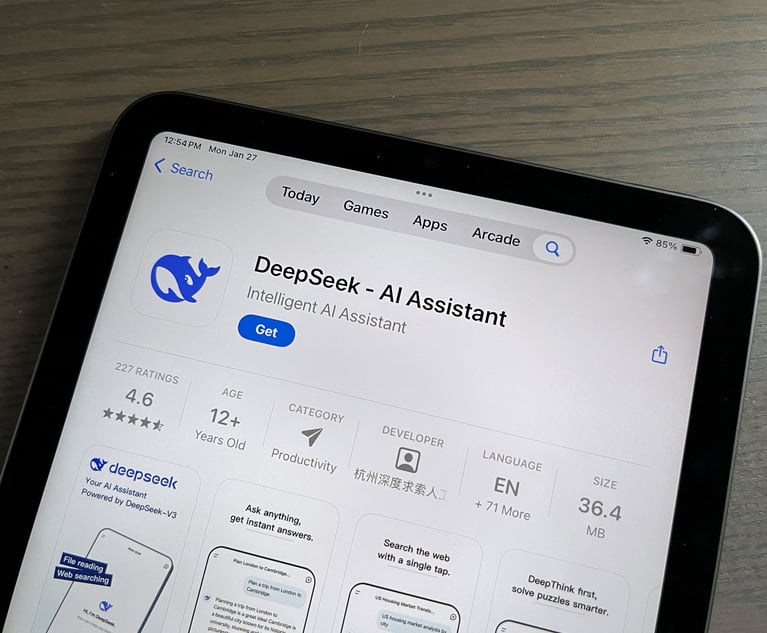Companies May Be Refreshing 'Bring Your Own Device' Policies During COVID-19
Employees using their own laptops or other devices when working from home may be necessary at the moment, but companies and legal departments may be looking for ways to minimize the rapidly expanding risk surface involved.
July 15, 2020 at 04:00 PM
3 minute read
 Photo: marvent/ Shutterstock
Photo: marvent/ Shutterstock
The COVID-19 outbreak has seen a great many more people working from home, which in turn likely translates to an increased reliance on personal computers, tablets, phones or other devices. A recent program hosted as part of the 2020 American Association of Law Libraries Virtual Conference—"Bring Your Own Device: No Longer an Option"—looked at what that development meant for law firms, but what about corporate legal departments and their organizations?
To be sure, an influx of personal device use creates a unique challenge for companies attempting to safely maintain and account for the security of their data. Frank Gillman, a principal at Vertex Advisors Group, noted that a business rapidly expands the surface of its network when it brings personal devices into the mix. And the number of variables at play only increases from there.
"If I'm working from home, my kids might be on that same computer, my spouse. Who knows who is using these devices? … So much more data is potentially leaking because of shared use," Gillman said.
But the dangers that personal devices could pose for a corporation's legal department may be far more calculated. Tom Gann, chief government affairs officer at McAfee, indicated that legal departments tend to be attractive targets in the eyes of hackers due to the sensitive or confidential information they contain.
"When it comes to a legal department, I would assign some of the highest-level of security risk to those organizations," Gann said.
And the headaches that personal devices might bring to legal departments don't just stop with a breach. Gillman pointed out that an employee conducting work from their home computer might one day be involved in litigation against an employer. Corporate attorneys could find retrieving evidence or discovery material from a personal device more difficult than if it were a company laptop.
Gillman stressed the need for companies to account for these potential logistical and security issues proactively as networks continue to expand. "You have to look at how that impacts all your policies and adjust them accordingly," Gilman said.
But are companies following through on that prerogative? According to Susanna McDonald, vice president and chief legal officer of the Association of Corporate Counsel, she's heard that fellow ACC members are already making changes to their BYOD and work-from-home policies—but not indiscriminately.
"Policy changes are specific to a given employee's job. One size does not fit all," she said in an email.
For example, employees who regularly handle sensitive data as a function of their job may be provided with company-issued smartphones. "This option is safer than dealing with sensitive data through one's personal device," McDonald said.
Other policy shifts may not be as heavily geared toward expensive equipment. Gillman said companies might configure networks to give employees limited access to certain data sets, granting them just enough time to complete an approved task before the window closes.
Meanwhile, Gann at McAfee stressed the value of training, a task that he suggested the corporate legal department could play a role in leading. Whatever preventative measures an organization chooses to deploy, he doesn't expect rolling back BYOD use entirely to be one of them.
"The cat is out of the bag and I don't see anyone putting it back in," Gann said.
This content has been archived. It is available through our partners, LexisNexis® and Bloomberg Law.
To view this content, please continue to their sites.
Not a Lexis Subscriber?
Subscribe Now
Not a Bloomberg Law Subscriber?
Subscribe Now
NOT FOR REPRINT
© 2025 ALM Global, LLC, All Rights Reserved. Request academic re-use from www.copyright.com. All other uses, submit a request to [email protected]. For more information visit Asset & Logo Licensing.
You Might Like
View All
Eighth Circuit Determines No Standing for Website User Concerned With Privacy Who Challenged Session-Replay Technology
7 minute read
The Time Is Now for Employers to Assess Risk of Employees’ Use of DeepSeek
4 minute read
Fired by Trump, EEOC's First Blind GC Lands at Nonprofit Targeting Abuses of Power
3 minute read
Houston Law Firm Files $250K Breach of Contract Suit Against 2 Former Lawyers
3 minute readTrending Stories
- 1Leaning Into ‘Core’ Strengths, Jenner’s Revenue Climbs 17%, Profits Soar 23%
- 2Frito Lays Could Face Liability for Customer's Grocery Store Fall Over Pallet Guard, Judge Rules
- 3Holland & Knight Expands Corporate Practice in Texas With Former Greenberg Traurig Partner
- 4Heir Cut: Florida Appellate Court Backs Garth Reeves' Will
- 5Class Action Allowed to Move Forward Against Philadelphia's 'Courtesy Towing' Program, Judge Rules
Who Got The Work
J. Brugh Lower of Gibbons has entered an appearance for industrial equipment supplier Devco Corporation in a pending trademark infringement lawsuit. The suit, accusing the defendant of selling knock-off Graco products, was filed Dec. 18 in New Jersey District Court by Rivkin Radler on behalf of Graco Inc. and Graco Minnesota. The case, assigned to U.S. District Judge Zahid N. Quraishi, is 3:24-cv-11294, Graco Inc. et al v. Devco Corporation.
Who Got The Work
Rebecca Maller-Stein and Kent A. Yalowitz of Arnold & Porter Kaye Scholer have entered their appearances for Hanaco Venture Capital and its executives, Lior Prosor and David Frankel, in a pending securities lawsuit. The action, filed on Dec. 24 in New York Southern District Court by Zell, Aron & Co. on behalf of Goldeneye Advisors, accuses the defendants of negligently and fraudulently managing the plaintiff's $1 million investment. The case, assigned to U.S. District Judge Vernon S. Broderick, is 1:24-cv-09918, Goldeneye Advisors, LLC v. Hanaco Venture Capital, Ltd. et al.
Who Got The Work
Attorneys from A&O Shearman has stepped in as defense counsel for Toronto-Dominion Bank and other defendants in a pending securities class action. The suit, filed Dec. 11 in New York Southern District Court by Bleichmar Fonti & Auld, accuses the defendants of concealing the bank's 'pervasive' deficiencies in regards to its compliance with the Bank Secrecy Act and the quality of its anti-money laundering controls. The case, assigned to U.S. District Judge Arun Subramanian, is 1:24-cv-09445, Gonzalez v. The Toronto-Dominion Bank et al.
Who Got The Work
Crown Castle International, a Pennsylvania company providing shared communications infrastructure, has turned to Luke D. Wolf of Gordon Rees Scully Mansukhani to fend off a pending breach-of-contract lawsuit. The court action, filed Nov. 25 in Michigan Eastern District Court by Hooper Hathaway PC on behalf of The Town Residences LLC, accuses Crown Castle of failing to transfer approximately $30,000 in utility payments from T-Mobile in breach of a roof-top lease and assignment agreement. The case, assigned to U.S. District Judge Susan K. Declercq, is 2:24-cv-13131, The Town Residences LLC v. T-Mobile US, Inc. et al.
Who Got The Work
Wilfred P. Coronato and Daniel M. Schwartz of McCarter & English have stepped in as defense counsel to Electrolux Home Products Inc. in a pending product liability lawsuit. The court action, filed Nov. 26 in New York Eastern District Court by Poulos Lopiccolo PC and Nagel Rice LLP on behalf of David Stern, alleges that the defendant's refrigerators’ drawers and shelving repeatedly break and fall apart within months after purchase. The case, assigned to U.S. District Judge Joan M. Azrack, is 2:24-cv-08204, Stern v. Electrolux Home Products, Inc.
Featured Firms
Law Offices of Gary Martin Hays & Associates, P.C.
(470) 294-1674
Law Offices of Mark E. Salomone
(857) 444-6468
Smith & Hassler
(713) 739-1250








